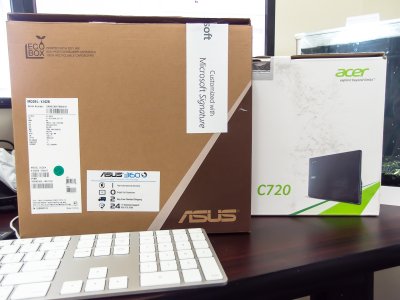iPads and Chromebooks do well in educational systems precisely BECAUSE of their limited OS, which easily limits and controls what students can do, and are easy to maintain. For a consumer though, the limited OS would be a drawback. Oh, and what "Windows burden" are you talking about?
And yes, if you're subjectively happy using a Fred Flintstone powered car (Chromebook) to get around town, then be subjectively happy. But objectively, the internal combustion engine powered car (Windows) is better.
I mean absolutely no offense, so please do not take this wrong, but "objectively" and "subjectively" do not seem to mean what you think they mean, or at least not in this context. Given that the entire final statement would have been immensely more accurately stated as, "But, in my opinion, the internal combustion engine powered car (aka Windows), is better at the tasks which I value in a portable computer operating system." That's the extent to where I'm quoting you, the rest is to the thread in general because this theme has been recurring for 7 pages.
First, to define objectivity we would have to define at what task(s) Windows performs better. For example, if speed, price, security, software obsolescence, software update quality and frequency, user friendliness, etc are chosen... Windows is going to lose all of those categories. Conversely, if developer support ubiquity in the current market, relative universal app compatibility and the ability to install .exe files are chosen as the criteria, then ChromeOS doesn't stand a chance. As these operating systems are developed with two completely different design philosophies for two completely different use cases, the only way to have an objective "winner" would be random sampling of users for the most commonly used tasks by users on semi-mobile computing devices.
For example, we could take the top 50 or 100 most common tasks that people use laptops for: Updating twitter, checking email, checking Facebook, updating their calendar, video conferencing, instant messaging, playing angry birds, taking notes in class, writing a paper, creating a budget, managing an online bank account, editing photos, updating Google+, sharing content with friends, reading the news, blah, blah, blah. We rank those tasks by the frequency of use among a population of 100,000 or so people chosen at random at universities, places of business, libraries, etc across the country and weight the importance of performance in each task according to that population.
Many things, such as everything listed so far, they're going to come approximately even on. When we factor in price, size, aesthetics, brand (some people don't trust Google, some people hate Microsoft), privacy policies (MS sells and shares user data, Google keeps your data in house), etc it is easy to see a picture forming in which from a functionality standpoint many people are going to detect no difference in the quality of the approach, given that almost all of the above listed things are done in the browser by most of these people today. At that point, it becomes a value proposition of that equal for most people product versus the less tangible things mentioned last. Given the lower price point, generally equal or better design (for that price point) and the differentiation of brand.
I know a lot of people who don't want to be anywhere near the internet on a Windows machine because they don't know how to keep MS out of their data, and buying a Mac is immediately quadrupling the price. I also know that there are a lot of people afraid of Google and who trust MS more. Finally, there is a small population who needs their laptop to do Windows specific tasks and they will not utilize any solutions that allow them to work around being on a different OS at the time of that task being executed.
This got way longer than intended, pretty sure everyone gets the point... different strokes, different folks is the exact opposite of "objective". Neither of these things is objectively lesser than the other unless you define a specific task and test it given the context of the devices that you're using. For a specific user, they sure can be one inferior to the other, and by a huge margin. I'd personal despise paying for a Windows laptop given that I already have one machine with Windows on it, and that's one too many 6 days a week for my personal computing needs. I need Windows at work, rarely do I *need* it at home. Others will feel the opposite. That's the definition of subjective as it is use case specifically addressed.


